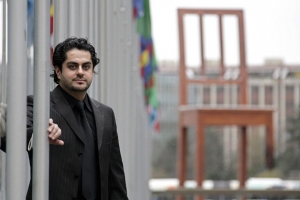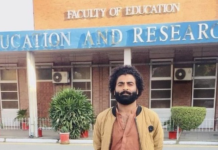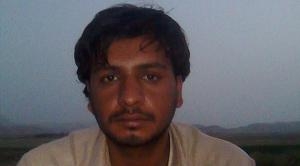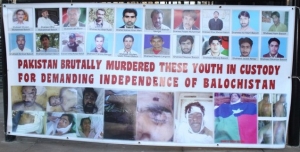by Ahmar MustikhanA declaration was adopted on the sidelines of a European Parliament meeting in Brussels that called for stopping the ongoing massacre of Baloch people in Balochistan. The declaration “Stop the Massacre” was adopted at a panel discussion “al-Qa’ida and the South Asia experience: Regional and Global perspectives” and was moved by Mehran Baluch, Balochistan representative at the U.N. Human Rights Council and youngest son of legendary Balochistan leader Nawab Khair Bakhsh Marri.Three prominent European experts who deal with terrorism and counter-terrorism issues led the panel discussion. These experts were member of European Parliament from Germany and the EP rapporteur Terrorist Finance Tracking Program, Alexander Alvaro; European Union Counter-terrorism Coordinator Gilles de Kerchove and Yvan Alexander.Mehran Baluch’s well-researched declaration said thousands of Baloch have been abducted, tortured and killed. Their mutilated bodies are continuing to appear every day in streets, dumps, shallow graves and the wilderness all across Balochistan.The West has been giving billions of dollars and weapons to the Pakistani military establishment to fight the war against terror. But the Pakistani generals use it mainly to bomb civilians in Balochistan instead of Taliban, Al-Qa’ida, Lashkar-e-Taiba or other Pakistani based terrorist groups.The Pakistani government has fought five wars against the Baloch. The last one started in 2006 was launched by former coup leader Pervez Musharraf, who left on the ground thousands of victims.Balochistan has become the forgotten Tibet of South Asia.While Baloch culture is secular and open minded, Balochistan has been filled with Taliban militants and integrists building madrassas and trying to impose strict Islamic code on the population. People are forced to replace their mother tongue with Urdu and to abandon their ancestral culture.According to the latest [url=http://www.amnesty.org/en/news-and-updates/pakistan-urged-investigate-murder-and-torture-baloch-activists-2010-10-26]Amnesty International[/url] reports 40 Baluch leaders and political activists have been killed over the past four months. Activists, politicians and student leaders are among those who have been targeted in enforced disappearances, abductions, arbitrary arrests and cases of torture and other ill-treatment.In the last four months, [url=http://www.amnesty.org/en/news-and-updates/pakistan-must-provide-accountability-rising-atrocities-balochistan-2011-02-23]at least 90 Baluch activists, teachers, journalists and lawyers have disappeared or been murdered[/url], many in “kill and dump” operations. The victims’ relatives and Baluch groups blame the “kill and dump” incidents on Pakistani security forces, particularly the Frontier Corps and intelligence agencies. Many of the victims were abducted by uniformed Frontier Corps soldiers, often accompanying men in plain clothes, in front of multiple witnesses.It is very difficult to get the real figures because the Pakistani government does not allow international organisations or journalists in the area. Balochistan has been cut off from the world and no independent reporting is allowed.According to informal sources 8,000 people have disappeared during the past 3 years. 1,600 have been killed. A quarter of million have been displaced. People didn’t receive any help during the last floods.When requested to investigate and give explanations about the enforced disappearances, the Pakistani government replied these people have gone abroad.Balochistan is potentially one of the richest areas of South Asia. It is rich in minerals, gas, uranium and has 1,400 km of coastline. Sui gas fields give almost 60% of the gas of Pakistan. However, literacy rates, occupation rates, social welfare numbers in Balochistan are between the lowest in the region. The Pakistani government is exploiting the area at gun point without giving any benefit to the local population.References: Link: http://www.amnesty.org/en/library/asset/ASA33/003/2011/en/d1cf2f95-79bf-4c2e-8149-649cbcfa97d6/asa330032011en.htmlLink: http://www.hrcp-web.org/pdf/balochistan_report_2011.pdfLink: http://www.afad-online.org/issues/sahtteredlives2010.htm.Ahmar Mustikhan is a journalist of longstanding from Balochistan, a Texas-sized stateless region divided among Pakistan, Iran and Afghanistan.Mehran Baluch is the Baloch representative in the United Nations Human Rights Council.






